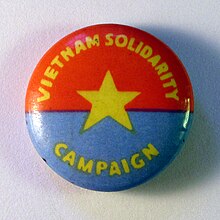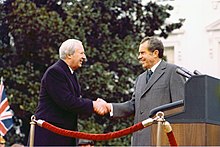United Kingdom and the Vietnam War
Prior to the 1964 Gulf of Tonkin Resolution, the United Kingdom began providing support to the South Vietnamese government in the form of advice on the use of police and paramilitary forces to combat a communist insurgency.[2] Conservative Prime Minister Winston Churchill refused American President Dwight Eisenhower's request to provide British military support for the French colonial forces engaged in the battle.[4] Wilson continued the previous Conservative government's policy of support for US military intervention in Vietnam,[4] though he was outspoken in his criticism of some aspects of the American war strategy, particularly the 1966 bombings of Haiphong and Hanoi.[4] Demonstrations were held outside the American Embassy in Grosvenor Square on March 17 and October 27, 1968, drawing thousands of protestors and culminating in violent clashes with the police.[21] Compared to Wilson, Conservative Prime Minister Edward Heath expressed greater rhetorical support of the American war effort in Vietnam.[22] The governments of Italy, Sweden, France, Belgium, The Netherlands, Denmark, Finland and Norway all condemned the high number of civilian deaths (over 2,000) caused by Operation Linebacker II, making Heath a rare source of international support for the bombings."Will the Prime Minister give a short, simple and categorical assurance that no matter what invitations his Government receive, British troops will never at any time be involved in the Vietnam conflict?"



the United KingdomVietnam War1954 Geneva ConferenceNorth VietnamSouth VietnamFirst Indochina WarGulf of Tonkin ResolutionSouth Vietnamese1964 escalation of American military involvement in VietnamHarold WilsonEdward Heaththe USAPacific WarOperation MasterdomFrench Colonial War in VietnamBattle of Dien Bien PhuConservativeWinston ChurchillDwight EisenhowerHarold MacmillanSaigoncounterinsurgency against communist forces in MalayaRobert ThompsonNgo Dinh DiemLyman LemnitzerRobert McNamaraJohn KennedyHo Chi Minh TrailLabour PartyPrime MinisterUnited States Congressauthorisedthe 1966 bombings of Haiphong and HanoiVietnam Solidarity CampaignBritish Hong KongRAF Little Sai Wan)Brian StewartTet truceAlexei KosyginRichard NixonLeader of the OppositionChristmas bombing campaign (Operation Linebacker II) in December 1972Wilson, HaroldPimlott, BenHarperCollinsJones, MatthewOutlineViệt Minh / PAVNViet CongInternational participantsUnited StatesThailandPhilippinesAustraliaPeople's Republic of ChinaRepublic of ChinaSouth KoreaNew ZealandLaotian Civil WarCambodian Civil WarCold War (1962–1979)Cold War in AsiaFrench IndochinaJapanese occupationState of VietnamViệt MinhVietnamese migration of 1954–551955 referendumNorth Vietnamese invasion of Laos1960 South Vietnamese coup attemptStrategic Hamlet ProgramIndependence Palace bombingBuddhist crisisCoup against DiemCoup against MinhGulf of Tonkin incidentResolutionDecember coupU.S. escalation / "Americanization"1965 South Vietnamese coupBombing of North VietnamBuddhist UprisingTet OffensiveKhe SanhCambodian campaignVietnamization policyARVN campaign in LaosEaster OffensiveChristmas bombingsParis Peace AccordsBattle of Phước Long1975 spring offensiveFall of SaigonCủ Chi tunnelsSihanouk TrailOperation PopeyeWeaponsAgent OrangeLand minesUnited States prisoners of warWar crimesMy LaiĐắk SơnCasualtiesBody count controversyPOW/MIA issueImpact of Agent OrangeEnvironmental impactCambodian–Vietnamese WarIndochina refugee crisisVietnamese boat peopleSino-Vietnamese WarVeteransNormalization of US–Vietnam relationsDraft evasion in the Vietnam WarOpposition to United States involvementProtestsUnited States news mediaAwards and decorationsCanada and the Vietnam WarCIA activities in VietnamHenry Kissinger’s involvementPentagon PapersWomen in the Vietnam War